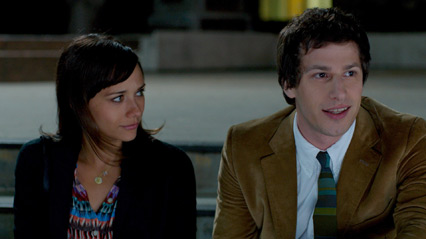In a series of posts, Midnites for Maniacs curator-host and Academy of Art film-history teacher Jesse Hawthorne Ficks reports on the 2012 Sundance Film Festival.
This was my 22nd consecutive Sundance Film Festival (which is well over half of my life), and I found myself more excited than ever to pack in as many films as humanly possible in seven days. Thirty-seven programs were achieved, and mind you: the trick is not to fall asleep, which so often happens at press screenings, resulting in many critics hypocritically denouncing whatever film they slept through.
Oddly enough, two of the biggest world premieres of the festival, Lee Toland Krieger’s Celeste and Jesse Forever and Josh Radnor’s Liberal Arts both explore the lives of thirtysomething men named Jesse who “have a lot of potential” but for some reason just aren’t making the most of their lives.
Krieger’s film is about a couple who have decided to get a divorce, yet find themselves spending even more time together than when they were married. Rashida Jones (from Parks and Recreation) and Andy Samberg (can we just talk about how underrated his 2007 film Hot Rod was?) star in an amazing dramatic comedy that allows a difficult subject (“How to break up with a loved one?”) to sneak up on you by the gripping third act. Allusions to Marc Webb’s decade-defining 500 Days of Summer (2009) are well-deserved; I found this film to be an instant classic.
Liberal Arts is Radnor’s follow-up to last year’s Dramatic Audience Award winner, Happythankyoumoreplease; it tells the (terrifyingly) relatable story of a thirtysomething intellectual (Radnor as Jesse) who falls for a plucky young student who is wise beyond her years; she’s played by Elizabeth Olsen, fresh off her astounding performance in last year’s Sundance hit Martha Marcy May Marlene. But this ode to Woody Allen’s Manhattan (1979) has more going for it than just an age-gap relationship dilemma. Not only does Zac Efron pop up as Jesse’s spiritual guru (which garnered major gasps from many audience members), but Richard Jenkins delivers a haunting performance as Jesse’s “second favorite professor” who has finally decided to retire from his tenured position. Radnor achieves a surprising amount of poignancy by way of light-hearted comedy. Woody Allen would no doubt approve.
With two films at the festival, cult actor-directors Tim Heidecker and Eric Wareheim (Tim and Eric Awesome Show, Great Job!) proved that they could tackle both heaven and hell. The comedy duo’s directorial debut, Tim and Eric’s Billion Dollar Movie, brought their purposefully clunky and abstract comedy to the big screen with some very mixed results. Following in the footsteps of such surreal “nonsense” masterpieces as H.C. Potter’s Hellzapoppin’ (1941), Bob Rafelson’s Head (1970), and Tom Green’s Freddy Got Fingered (2001), fans of the show will be treated to many truly disgusting and hilarious sequences along with a ton of cameos, leaving the uninitiated understandably dumbfounded.
However, the 90-minute film did seem to have some trouble translating the chaotic immediacy of Awesome Show‘s 11-minute episodes, leaving many in the midnight premiere wanting desperately to laugh a whole lot more. (Not sure I agree with the film’s “Better than The Lorax” ad campaign, but they get points for inventive advertising.)
But not to fear, Rick Alverson‘s ironically titled The Comedy was the jewel of the festival, or the anti-jewel — it was the most polarizing film of Sundance 2012. It follows a 35-year-old Williamsberg hipster named Swanson (stunningly played by Heidecker) as he antics through his daily quest: attempting to get any reaction from any sort of person. This leads him to say and do some of the most confusing and borderline offensive stuff imaginable.
While this sent many towards the exit doors (and left a fair amount baffled in their seats, whispering “This has got to be the worst film ever made!”), audience members who dared remain were treated to a perceptive, modern-day study of hipster culture that reveals a despicable and terrible truth. You may find yourself relating to Alverson’s perceptive anti-hero in ways comparable to Robert DeNiro in Taxi Driver (1976), Peter Falk in Husbands (1970), and Jack Nicholson in Five Easy Pieces (1970). And since The Comedy was made not necessarily to be enjoyed, it will probably, sadly, take 20 years for people to recognize that there is no finer film to define this generation.
This isn’t to say that there aren’t going to be more films presenting what it is to be modern day man-child — after all, mumblecore movies and hipster cinema emerged as early as 1991 with Richard Linklater’s Slacker. I noticed that many people at Sundance were immediately averting themselves from Destin Daniel Cretton’s I Am Not a Hipster, just because of its title. It’s a curious dilemma that plagues this era (and it relates directly to Alvie Singer’s life philosophy: “I would never want to belong to any club that would have someone like me for a member.” This quote from Woody Allen’s 1977 Annie Hall, itself a Groucho Marx reference, seems to be one of the most difficult hurdles for super-self-aware hipster culture to overcome.)
Cretton’s film focuses on Brook (played by Dominic Bogart), a skinny-jeaned indie rocker who finds himself trapped in a cycle of contempt and cynicism. Suddenly his three sisters arrive (Greek chorus, anyone?), thus beginning a surprisingly genuine exploration of the kind of grumpy guy that most of us thirtysomethings have either been or encountered this past decade. Some very true emotions are earned by the end of this 90 minutes; hopefully audiences will confront their individual issues and start taking that next step towards embracing their own hipster tendencies. Or not.
Up next: Jesse Hawthorne Ficks’ second Sundance Diary, covering even more dramatic competition films, midnight movies, and more. He saw 37 films, people. His diary is epic!

